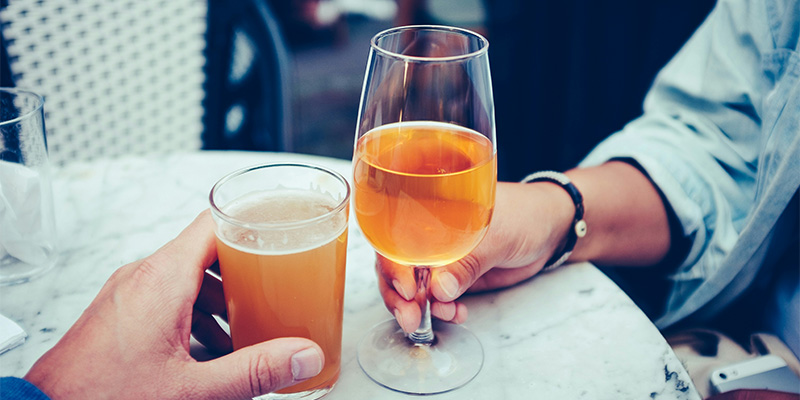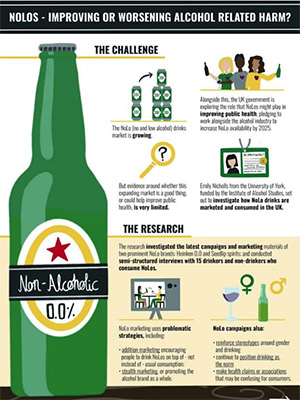Last orders? Understanding the marketing and consumption of No and Low alcohol products
-
Case study
- Health and Wellbeing
Posted on 2 October 2024
Research in the Sociology department has improved our understandings of how people use No and Low (NoLo) alcohol drinks and the ways in which they are marketed, helping to inform policy and regulation.

The issue
The UK’s No and Low (NoLo) alcohol drinks market is expanding rapidly, yet we currently know very little about how NoLo products are marketed and used.
We need to establish a more developed evidence base to (a) help policymakers understand whether NoLos could improve public health (for example by replacing alcohol in some circumstances) and (b) make sure NoLos are being advertised and marketed in an appropriate way. This is particularly important because marketing for NoLos is subject to less regulation than alcohol marketing.
The research
In research funded by the Institute of Alcohol Studies, Dr Emily Nicholls examined the ways in which NoLos are marketed and used by consumers in the UK. The project involved a media analysis of two major marketing campaigns and social media material for NoLos. This was accompanied by in-depth interviews with drinkers and non-drinkers who consume NoLos to enhance our understandings of how and why people use them.

The research identified that some consumers are using NoLos as a ‘substitute’ for alcohol (for example, drinking NoLos at home and alcohol in public, or NoLos during the week and alcohol at weekends).
However, the research also revealed problematic marketing practices, including promoting NoLos as something to be drunk in addition to one’s usual alcohol consumption and ‘stealth’ marketing. NoLos are often produced by parent alcohol brands and designed to mimic that brand’s alcoholic options in terms of branding, presentation and taste, so stealth marketing occurs when a NoLo is advertised in a way that promotes the parent brand.
The outcome
A report was produced at the end of the project, which was shared with the Scottish and British government and informed a briefing for UK government ministers. The report has been cited by the World Health Organisation and Emily has been invited to present the findings directly to the UK Government Office for Health Improvement and Disparities and Institute of Public Health in Ireland. This has helped to directly support policymakers considering the potential – or otherwise – of NoLos to improve public health.
Emily was also invited to meet with the Advertising Standards Agency to discuss the future of the regulation of NoLo marketing. The report was later cited by three different organisations responding to a Committee of Advertising Practice consultation about changing the marketing regulations. In 2023, new guidance on the marketing of NoLos was published, stating that – amongst other changes – any NoLo advertising which promotes a parent alcohol brand must now be subjected to the same advertising regulations as alcohol marketing. As a result, this research has helped to contribute to the introduction of new and stricter guidelines around NoLo marketing.
- The Marketing and Consumption of No and Low alcohol drinks in the UK
- Help or harm? Exploring the expanding ‘No and Low’ alcohol market in the UK
- Soberful – The Alcohol-free drinks market with Emily Nicholls
- “I don't want to introduce it into new places in my life”: The marketing and consumption of no and low alcohol drinks
- Example of the research being cited by the World Health Organization
- New guidance on the marketing of No and Low alcohol drinks

